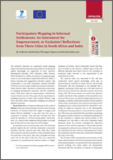|
In the past decade, Brazil caught the attention of both financial and political observers worldwide. Economists noted Brazil’s position as a member of the emerging markets group known as the BRIC, and political commentators focused on the election of Luiz Inácio Lula da Silva, known popularly as Lula, a founding member of the Workers Party (PT), as President, as well as on the proliferation of participatory governance institutions. The growth and implementation of participatory budgeting in the 1990s, and the extension of institutionalized venues of participation such as Policy Management Councils, and national conferences, consolidated Brazil’s international reputation as a laboratory of participatory democracy. Basking in the glow of this international attention, the country hosted mega sporting events like the XV Pan American Games in 2007, the Confederations Cup in June 2013, the World Cup in June 2014, and it will host the Olympics in 2016.
The huge public protests that filled the streets of several Brazilian cities –twelve capitals and midsize cities– in late June, 2013 revealed a darker side of this bright portrayal of Brazil. An estimated one million people protested the expenditures for the mega events while key social services –public transport, education, health and housing– as well as social security, were facing serious problems and budget cuts. Although the protests were fragmented and lacked clear leadership, they all produced similar demands. All the protests denounced government corruption, demanded more democracy, more political accountability and, as surprising as it may seem, more participation.
Chance2Sustain Opinion Series - ISSN 2308-0965 |
Recent Chance2Sustain Publications |
|
|
|
|
|

